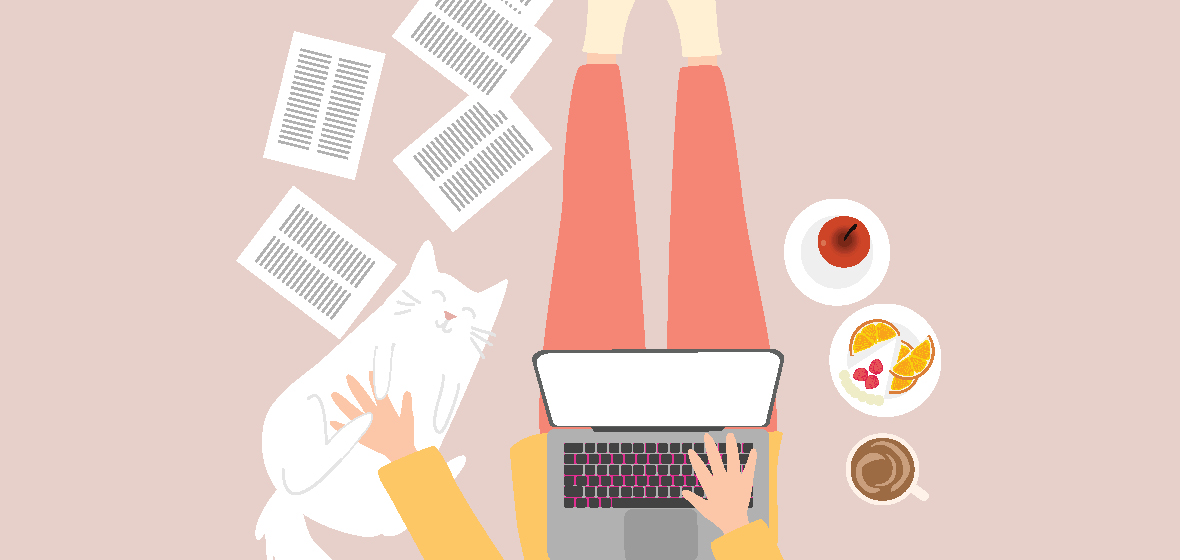The legal profession has experienced a lot of ups and downs since the outbreak of COVID-19. It’s a mixture of camaraderie and concern as the justice system is turned on its head.
The last few weeks have dramatically changed the way law is practised in Australia.
The change happened quickly, as the risk of sending people to work in the middle of a potentially deadly virus outbreak simply became too great. One by one, firms started sending lawyers home, fast-tracking plans to improve digital infrastructure and rapidly rolling out new management strategies.
Some changes have been positive. Modernising workplaces to allow flexible and remote working to be done seamlessly is something that will likely stay. Navigating uncharted territory has reignited a sense of camaraderie and collegiality across the profession. Opportunities to be a little bit cheeky – shirking the rigid formality of legal conventions – is creating private moments of fun, never to be spoken of in public.
You are not alone if you’ve merrily created a makeshift standing desk out of empty wine boxes, gleefully taken important calls in your pyjamas, or enjoyed breaks while playing fetch with your cat.
Other changes, however, have brought a sense of gloom. Job cuts are an ongoing concern, both for lawyers and for administrative support teams. Closures are putting a stop to a lot of court-related work. Clients, particularly those in family and criminal matters, are facing unprecedented hardship. Billables are reduced. Overheads need to be paid. An indefinite period of isolation is weighing on everyone.
The COVID-19 pandemic has created an unprecedented disruption to the courts, like many other institutions. However, during these exceptional times, it is more important than ever that the wheels of justice continue to turn.
The Honourable Thomas Bathurst AC
Modernising legal practice
Many firms have long had the technology for staff to work remotely, but the COVID-19 outbreak has expedited the process and enabled them to embrace the positives that come with working from home. It’s also improved the way lawyers communicate and has put a spotlight on mental health.
Herbert Smith Freehills (HSF) is a global law firm with an office in Sydney. All its Australian-based staff are now working from home and the firm is taking progressive measures to support their wellbeing. For example, HSF is publishing webinars with its resident psychologist, making regular group exercise classes available via Zoom, and publishing resources on everything from IT tips to parenting advice.
“I think as a leader, it’s important to remain optimistic and positive and to convey that in all my interactions with our people. That’s what I try to do. I’ve also found that a real sense of camaraderie has developed out of us all being in the same position,” says Juliana Warner, Managing Partner.
She tells LSJ she has found working from home less challenging than she initially thought (after overcoming some initial challenges with her home printer and scanner) and her day-to-day tasks have remained relatively consistent. Warner also notes that the line between home and work has blurred, and she says she’s working on putting in some boundaries to make remote working sustainable.
Other lawyers agree the transition has generally been smooth.
Justin Dowd, a director at family law firm Watts McCray, says a large proportion of the firm’s workforce is made up of parents with young children. School closures may add extra pressure, particularly if home-schooling becomes necessary, but he says many of the firm’s lawyers already work from home or on part-time hours. As such, the team is well-versed in juggling the demands of parenting with work.
For the most part, it has been business as usual. He says the biggest change so far hasn’t been about the way people work, but the way they communicate with their colleagues. Conversations are no longer focused solely on each person’s workload, he explains, but their wellbeing.
“The partners, we used to meet once a month, but now we have a video conference once a week to check on things. We’ve become more focused on our business units, so there’s a greater level of communication than there ever was previously, because we really took it for granted,” he says.
“Previously, if we tried to have a meeting, someone would be in court, someone would be at another office, someone else might be sick. Now they’re at the end of the phone, so we can always reach them. We’re consciously calling each other and checking what’s happening, how they’re coping.”
Client interactions have been similar. Many firms are using technologies such as Skype and Zoom to facilitate meetings, and although some lawyers have raised concerns over privacy when using these platforms to conduct confidential meetings, things are generally running smoothly.
Things have been much more difficult for the courts.
It’s not just a matter of installing some software and sending people home. You need to invest in culture and processes. Measuring goals is a big one that people forget.
Tomoyuki Hachigo
Trials and tribulations
“The COVID-19 pandemic has created an unprecedented disruption to the courts, like many other institutions. However, during these exceptional times, it is more important than ever that the wheels of justice continue to turn,” said The Honourable Thomas Bathurst, Chief Justice of New South Wales, in a statement to LSJ.
“The Supreme Court, like all courts, provides an essential service.”
The Supreme Court, Court of Appeal and Court of Criminal Appeal have rapidly transitioned to a system of “virtual courts” to enable as many proceedings as possible to be heard. Of the 162 civil hearings listed in the Common Law Division to start in March and April, only four have been vacated due to issues arising from the outbreak. Meanwhile, of the 11 trials set to start in the Criminal Division, seven jury trials have been vacated and one has consented to trial by judge alone.
There have been no personal appearances in any matters since 24 March, and while all courts have struggled with technological problems, His Honour indicated that they may lead to positive change.
“The transition to a virtual system of justice occurred at a previously unimaginable speed. A transformation that would have previously taken six months occurred in six days. I would be the first to admit there have been technical difficulties, but they are being progressively overcome,” he said.
“It’s valuable to remember the opportunity that the current situation presents for promoting innovative ways of delivering justice. The rapid shift to virtual courts has accelerated reforms that will increase the flexibility and accessibility of the courts and the legal profession. I am sure that the innovations developed in these times will hold our justice system in good stead well into the future.”
The lower courts have undoubtedly borne the brunt of the impact.
Kelly Fedor, Chief Court Reporter at Nine News Sydney, frequently works from the Downing Centre Local Court. She says court staff members are working hard to keep things running – for example, in the sentencing of veteran homicide detective Gary Jubelin in April, who was convicted over a number of illegal recordings made in the course of his investigation into missing NSW toddler William Tyrrell.
“The Jubelin hearing was standing room only, in the smallest court of the Downing Centre, back in February. For the verdict and sentencing, they put us in the biggest court and banned everyone – the only people in the court were people directly connected to the proceedings, and the media,” she says.
However, technological difficulties have been severe.
Fedor says many parties have struggled to connect to virtual courtrooms. In one matter, a victim was appearing via video link from Queensland, but the background noise on the offender’s end was so distracting that the court couldn’t hear the victim impact statement. The judge suggested disconnecting the offender, but Fedor observed that essentially defeated the purpose of giving the statement.
Court closures have hit criminal matters particularly hard. Jury trials are no longer running. Clients who are remanded in custody face lengthy delays in getting bail. People who have interim AVOs against their name can’t have their matters heard. Court AVL systems have, at times, been massively overloaded. A large percentage of the legal work has disappeared. Job cuts are ongoing.
A criminal lawyer, who asked not to be identified, tells LSJ the next steps are very important.
“I’m not for a second disputing the fact that we need to do social distancing, but there needs to be a thought process. I don’t know how the courts are going to deal with ‘after’ – we need to think about it, because ‘after’ is coming. At some point, the lower courts will open up again, and there will be a bigger backlog than ever. Something has to be done, otherwise a six-month backlog will turn into a year, or longer. For people who are on bail – or worse, denied bail – that worries me. How do we deal with that?”
Friday night drinks
In the meantime, team culture has become more important than ever.
In some ways, Tomoyuki Hachigo was uniquely prepared for COVID-19. He’s a co-founder and principal at Sprintlaw, an online law firm based in Sydney that provides legal services to small businesses, and he’s given a lot of thought to the culture of remote working.
“It’s not just a matter of installing some software and sending people home. You need to invest in culture and processes. Measuring goals is a big one that people forget,” he says.
“Traditionally, they would be measured by billable hours, but you also need to worry about whether your customers are happy. It’s more important when people are working remotely, and you have a more distributed workforce, that you have purpose-driven goals.”
From a management perspective, Sprintlaw has switched from traditional KPIs (key performance indicators) to OKRs (objectives and key results). Hachigo explains the idea is to focus on team goals.
“Our philosophy is that people work better, and they’re more collaborative, that way. You need a bit of competition, but if it’s all just billable hours, there’s a lot of unproductive time spent fighting over the same work. We’re also really transparent about how the business is going,” he says.
“It’s really important when you have people working remotely. The old way of managing is focused around making sure everyone turns up to work, but we believe people are happier and more productive if you give them a reason to be. It’s a different way of thinking.”
Change has been thrust upon the legal profession, and while forced innovation can be a good way to modernise strategy and generally shake things up, the impact on practice has been significant. It’s particularly challenging when it’s paired with social distancing and economic pressure.
Feel-good institutions, like Friday night drinks, have always helped build and reinforce positive team cultures. In this climate, however, they’ve become indispensable. Many lawyers, from top-tier firms to start-ups, have told LSJ they look forward to virtual networking opportunities. It’s fun to banter, talk about work, discuss the news and meet each other’s families and pets.
Most importantly, it’s a reminder that we’re all in this together.




